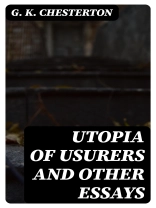In ‘Utopia of Usurers and Other Essays, ‘ G. K. Chesterton presents a compelling critique of economic practices and societal norms through a series of incisive essays. The literary style of Chesterton engulfs the reader with sharp wit and paradoxical insights, employing a blend of humor and profound philosophical inquiry. The essays challenge contemporary attitudes toward capitalism and usury, revealing the moral implications underlying financial systems while contextualizing them within early 20th-century socio-economic discourse. Chesterton’s prose is both accessible and rich, engaging readers in his contemplative examination of society’s values. G. K. Chesterton was a prolific English writer, philosopher, and critic born in 1874, whose diverse works spanned genres and themes. His often contrarian perspectives stemmed from his deep Christian beliefs and a desire to defend traditional values amidst modernity’s chaos. Chesterton’s struggle against materialism and his passionate calls for social justice profoundly influenced his writing on economic issues, making ‘Utopia of Usurers’ a natural exploration of his beliefs about justice and morality in financial practices. This collection is a must-read for those interested in the intersections of economics, morality, and imagination. Chesterton’s essays are not only thought-provoking and engaging but also resonate with contemporary discussions about finance and ethics. Readers seeking to challenge their perspectives and engage with philosophical debates will find a rich intellectual landscape in this remarkable work.
Про автора
Gilbert Keith Chesterton (1874–1936) was a prolific English writer, critic, and philosopher revered for his witty prose, his trenchant social criticism, and his ability to illuminate the paradoxes of life through his narrative artistry. Chesterton’s literary contributions span several genres, including journalism, philosophy, poetry, biography, and the detective fiction for which he is perhaps most fondly remembered, with his Father Brown stories standing as perennial classics. He was a master of paradox and a defender of the common man, consistently seeking the wonder in the everyday. Chesterton’s ‘Utopia of Usurers and Other Essays’ (1917) is a compelling example of his social and economic critique, where he expounds on the moral and societal dangers posed by capitalism unbound by ethical constraints. It demonstrates his ability to probe the sociopolitical issues of his time with both incisive logic and a profound sense of morality. His work is marked by a pithy elegance and a unique propensity for employing allegory and satire to dissect the issues facing the society of his day. Acknowledged by literary figures such as Ernest Hemingway and C.S. Lewis for his notable influence, Chesterton’s works continue to be studied for their insight, wit, and enduring relevance to contemporary debates.












